As a popular and versatile oil, avocado oil has found its way into many kitchens. It’s a favorite among health enthusiasts, thanks to its high levels of monounsaturated fats, vitamins, and minerals.
However, there are times when you may need to substitute avocado oil in your recipes. This could be due to allergies, taste preferences, or simply because it’s not readily available.
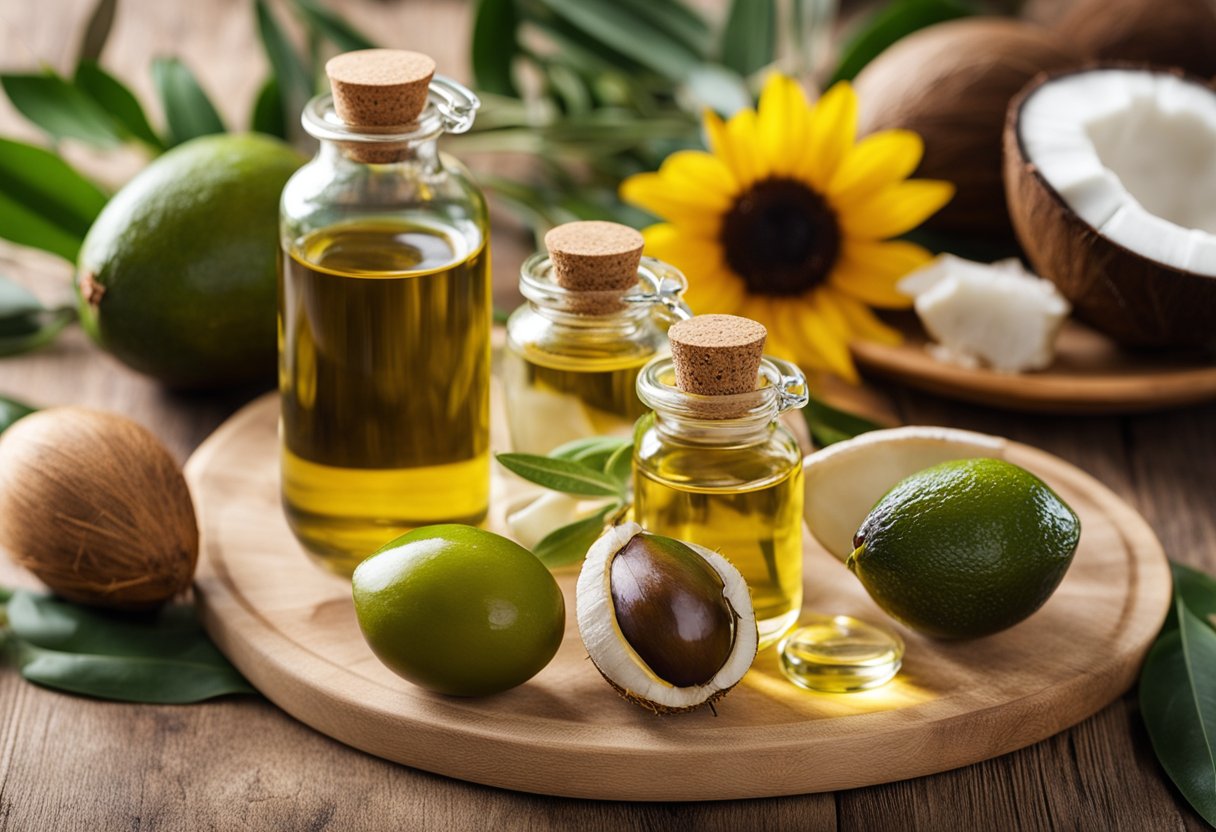
Finding the right substitute for avocado oil can be tricky. You want an oil that can provide similar flavor, nutritional value, and cooking properties. Fortunately, there are several oils that can serve as excellent substitutes for avocado oil.
In this article, I’ll walk you through the best avocado oil substitutes for cooking, baking, dressings, and marinades. We’ll also explore the characteristics of a good substitute and compare the nutritional value of different oils.
Key Takeaways
- There are several reasons why you may need to substitute avocado oil in your recipes.
- A good avocado oil substitute should offer similar flavor, nutritional value, and cooking properties.
- The best avocado oil substitutes for cooking, baking, dressings, and marinades include olive oil, grapeseed oil, coconut oil, and more.
Understanding Avocado Oil
As someone who enjoys cooking, I have come across avocado oil in many recipes. Avocado oil is a type of oil that is extracted from the pulp of an avocado fruit. It has a high smoke point, making it ideal for frying, baking, and sautéing.
One of the reasons avocado oil is popular among health enthusiasts is because it is high in monounsaturated fats. Monounsaturated fats are considered healthy fats because they can lower bad cholesterol levels and reduce the risk of heart disease.
In fact, avocado oil contains even more monounsaturated fat than olive oil, which is also known for its health benefits.
In addition to monounsaturated fats, avocado oil is also rich in vitamin E, which is a powerful antioxidant. Antioxidants can help protect the body against inflammation and oxidative stress, which are linked to many chronic diseases.
Avocado oil is also a good source of potassium, a mineral that is important for heart health. Potassium can help regulate blood pressure and reduce the risk of stroke.
When it comes to its nutritional profile, avocado oil is high in calories and fat, with 120 calories and 14 grams of fat per tablespoon.
However, it is low in saturated fat and high in monounsaturated and polyunsaturated fat, which makes it a healthier option compared to other types of oil.
Overall, using avocado oil in your cooking can provide many health benefits. It can help lower cholesterol, reduce the risk of heart disease, and fight inflammation. However, it is important to use it in moderation, as it is still high in calories and fat.
The Need for Substitutes
As someone who enjoys cooking with avocado oil, I understand the need for substitutes. There are several reasons why someone may need to substitute avocado oil in their recipes.
One reason is allergies. Some people may have an avocado allergy and cannot use avocado oil in their cooking. In this case, it’s important to find an alternative oil that works for their dietary needs.
Another reason is expense. Avocado oil can be quite expensive, especially if you are using it frequently in your cooking. Finding a substitute oil that is more affordable can help you save money in the long run.
Shelf life is also a consideration. Avocado oil has a relatively short shelf life compared to other oils, so finding a substitute with a longer shelf life can be beneficial.
Overall, there are several reasons why someone may need to substitute avocado oil. It’s important to find a substitute that works for your specific needs, whether it be due to allergies, expense, or shelf life. In the following sections, I will explore some of the best avocado oil substitutes available.
Characteristics of a Good Substitute
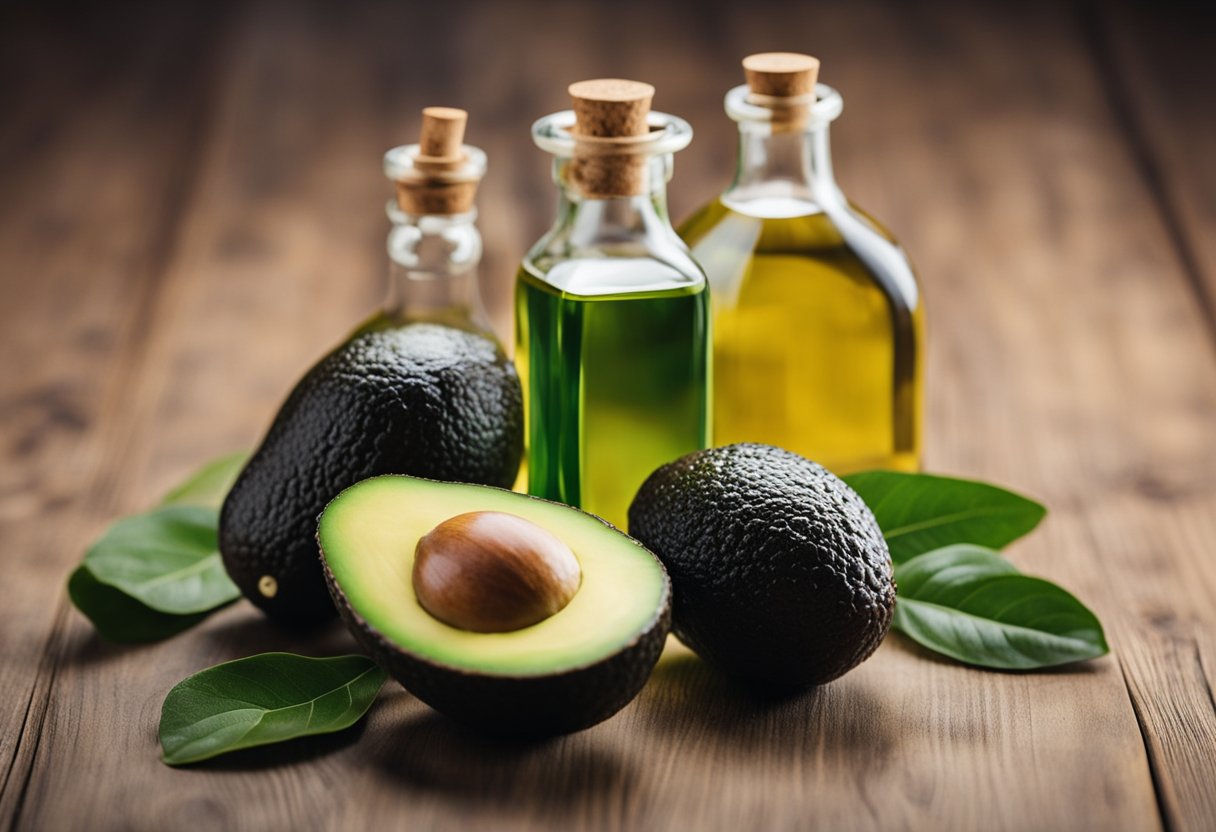
When looking for a substitute for avocado oil, there are a few key characteristics to consider. Here are some important factors to keep in mind:
Smoke Point
The smoke point of an oil is the temperature at which it begins to smoke and break down. When oils reach their smoke point, they can produce harmful compounds and lose their nutritional value.
Avocado oil has a relatively high smoke point of around 520°F (271°C), making it a good choice for high-heat cooking methods like frying and roasting. When looking for a substitute, it’s important to choose an oil with a similarly high smoke point to avoid burning or smoking.
Flavor
Avocado oil has a mild, buttery flavor that works well in a variety of dishes. When choosing a substitute, consider the flavor profile of the oil and how it will complement your recipe.
Some oils, like coconut oil and sesame oil, have a distinct and unique flavor that may overpower or clash with certain dishes. Other oils, like extra light olive oil and grapeseed oil, have neutral flavors that can work well in many recipes.
Texture
The texture of an oil can also affect its performance in cooking. Avocado oil has a smooth and silky texture that makes it a good choice for dressings and sauces. When choosing a substitute, consider the texture of the oil and how it will affect your recipe.
Some oils, like coconut oil and ghee, have a solid or semi-solid texture at room temperature that can make them difficult to work with in certain recipes.
High Smoking Point
A good substitute for avocado oil should have a high smoking point. This is important for high-heat cooking methods like frying and roasting. Some good substitutes with high smoking points include extra light olive oil, grapeseed oil, and peanut oil.
Neutral Flavors
If you’re looking for a substitute with a neutral flavor, consider using extra light olive oil, grapeseed oil, or sunflower oil. These oils have a mild flavor that won’t overpower your recipe.
Nutty Flavor
If you’re looking for a substitute with a nutty flavor, consider using macadamia nut oil or flaxseed oil. These oils have a rich, nutty flavor that can add depth to your recipe.
In summary, when looking for a good substitute for avocado oil, consider the smoke point, flavor, texture, and cooking method of the oil.
Some good substitutes include extra light olive oil, grapeseed oil, and coconut oil. By choosing the right oil for your recipe, you can create a dish that is both delicious and healthy.
Avocado Oil Substitutes for Cooking
When it comes to cooking, avocado oil is a popular choice due to its high smoke point and neutral flavor. However, if you don’t have avocado oil on hand or want to try something different, there are plenty of substitutes available.
One option is coconut oil, which has a similar high smoke point and can be used in a 1:1 ratio for most recipes. It also adds a subtle coconut flavor to dishes.
Olive oil is another great substitute, especially for baking and sautéing. Use extra virgin olive oil for a stronger flavor or a lighter olive oil for a more neutral taste.
Peanut oil is a good choice for high-heat cooking methods like stir-frying and deep-frying. It has a high smoke point and a mild flavor that won’t overpower other ingredients. Butter and clarified butter are also good substitutes, especially for baking and roasting.
Grapeseed oil is another option with a high smoke point and neutral flavor. It’s a good choice for stir-frying and sautéing. Sesame oil, both raw and toasted, can add a nutty flavor to dishes and is great for roasting and shallow frying.
Sunflower oil is a versatile substitute that can be used for most cooking methods, including high-heat cooking. It has a neutral flavor and a high smoke point. Vegetable oil is another neutral-flavored option that can be used in a 1:1 ratio for most recipes.
Macadamia nut oil is a flavorful option that works well for baking and roasting. Canola oil is another neutral-flavored choice that can be used for most cooking methods, including high-heat cooking.
Flaxseed oil is a healthy substitute that is high in omega-3 fatty acids. It has a low smoke point, so it’s best used for low-heat cooking methods like drizzling over salads or adding to smoothies.
Safflower oil is another healthy option with a high smoke point that works well for high-heat cooking methods.
When substituting for avocado oil, it’s important to consider the cooking method and temperature. Choose a substitute with a similar smoke point to ensure the best results.
Experiment with different substitutes to find your favorite flavor and cooking method.
Avocado Oil Substitutes for Baking
When it comes to baking, avocado oil can be replaced with a variety of other oils and fats. Here are some of the best substitutes:
Butter
Melted unsalted butter is a great substitute for avocado oil in baking. It adds a rich flavor and can be used in a 1:1 ratio. Vegan butter or ghee can also be used as a substitute.
Coconut Oil
Coconut oil is another great substitute for avocado oil in baking. It has a similar texture and can be used in a 1:1 ratio. However, it does have a distinct coconut flavor that may not be desirable in all recipes.
Olive Oil
Extra-virgin olive oil can be used as a substitute for avocado oil in baking. However, it has a lower smoke point than avocado oil, so it may not be suitable for high-heat baking. Use it in a 1:1 ratio for best results.
Vegetable Oil
Vegetable oil is a neutral-flavored oil that can be used as a substitute for avocado oil in baking. It can be used in a 1:1 ratio, but keep in mind that it is a highly processed oil and may not be as healthy as other options.
Canola Oil
Canola oil is a healthier alternative to vegetable oil and can be used as a substitute for avocado oil in baking. It can be used in a 1:1 ratio and has a neutral flavor.
When substituting oils in baking, keep in mind that the ratio may need to be adjusted depending on the recipe. It is always a good idea to do a test batch before making a large batch to ensure that the substitution works well.
Avocado Oil Substitutes for Dressings and Marinades
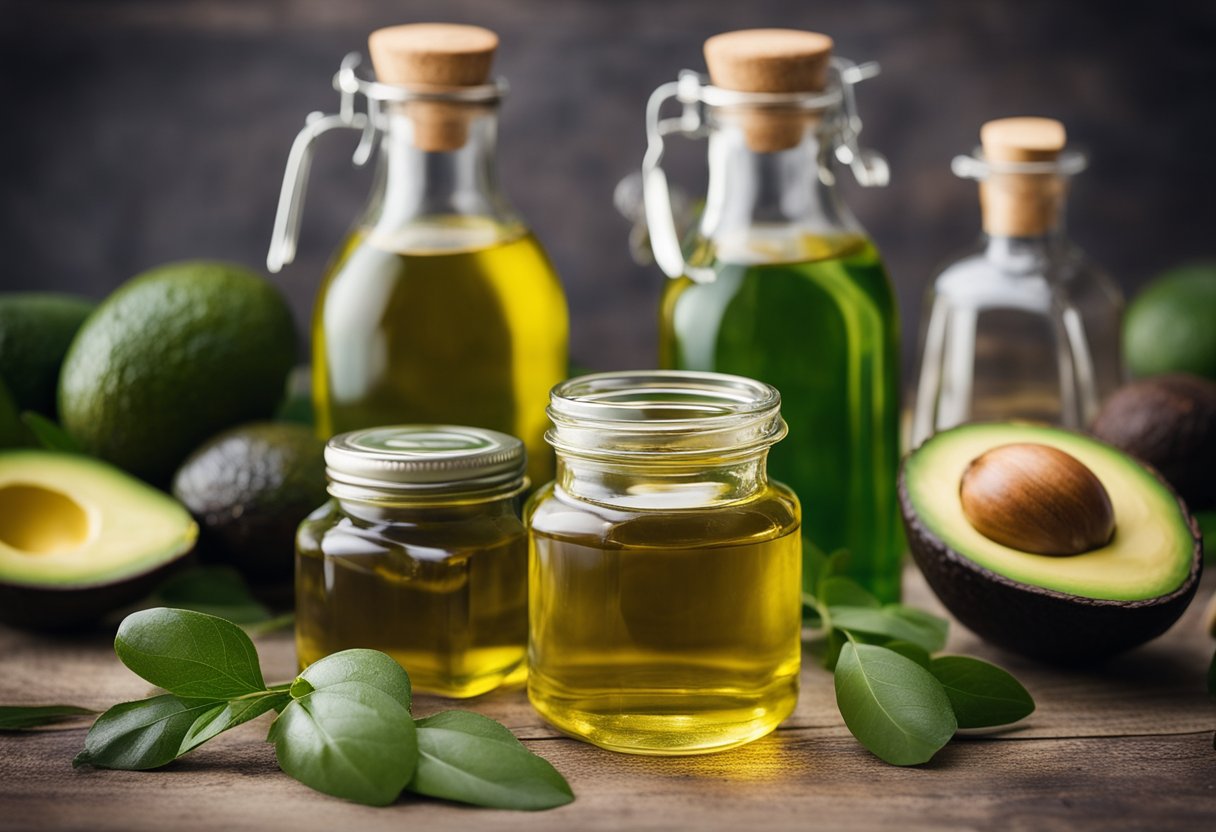
When it comes to making dressings and marinades, avocado oil is a popular choice due to its mild flavor and high smoke point.
However, if you don’t have avocado oil on hand or prefer to use a different oil, there are plenty of substitutes that can work just as well.
One of the most popular substitutes for avocado oil in dressings and marinades is extra virgin olive oil. This oil has a similar mild flavor and can be used in a 1:1 ratio as a substitute for avocado oil.
Another option is sesame oil, which has a nutty flavor that can add depth to dressings and marinades. However, it should be used sparingly as it has a strong flavor.
Flaxseed oil is another substitute that can work well in dressings and marinades. It has a nutty flavor and is high in omega-3 fatty acids, making it a healthy choice.
However, it is important to note that flaxseed oil should not be heated, so it is best used in cold dressings and marinades.
For a more neutral flavor, vegetable oil or canola oil can be used as a substitute for avocado oil. These oils have a higher smoke point than olive oil, making them a good choice for high-heat cooking methods like grilling or roasting.
When substituting oils in dressings and marinades, it is important to consider the ratio of ingredients. A 1:1 ratio can often work, but it is best to taste and adjust as needed to achieve the desired flavor and consistency.
Overall, there are plenty of options for substituting avocado oil in dressings and marinades. Experiment with different oils to find the one that works best for your recipe and taste preferences.
Nutritional Comparison of Substitutes
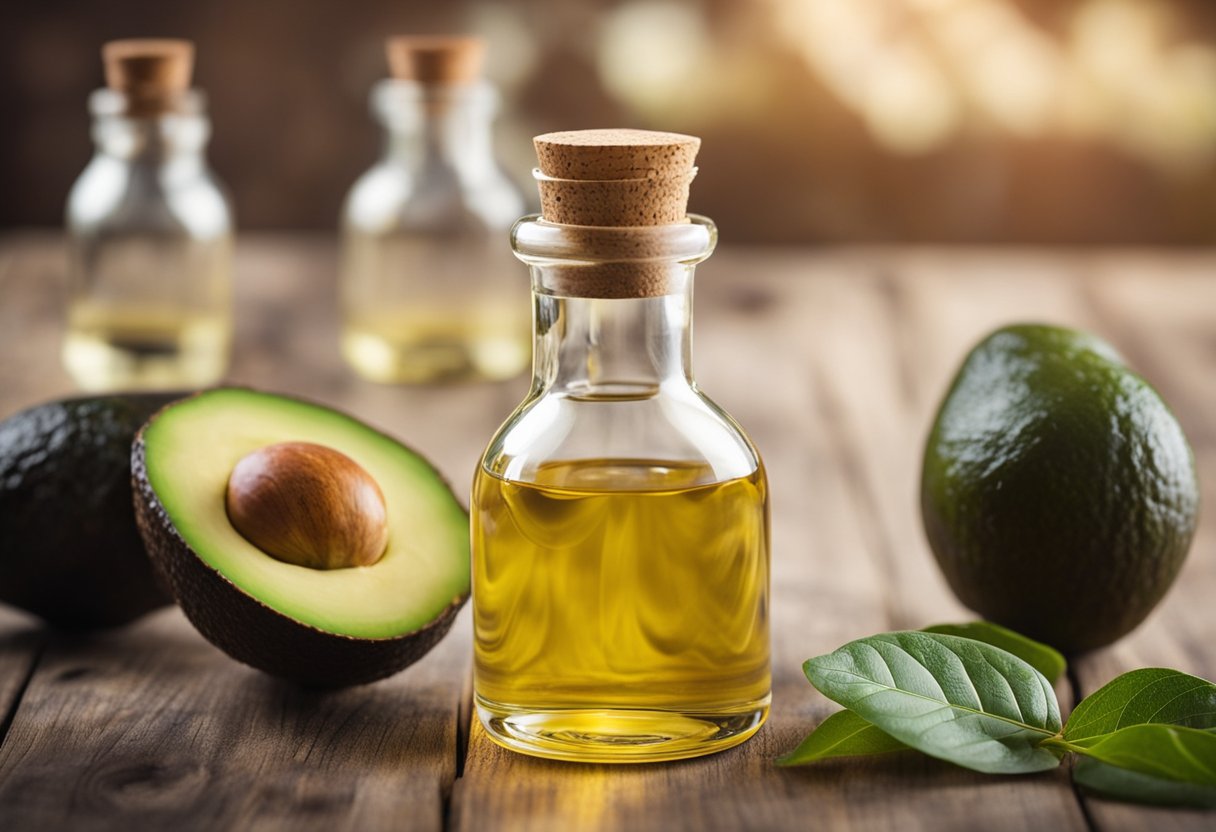
When it comes to choosing a substitute for avocado oil, it’s important to consider the nutritional profile of the alternatives. While avocado oil is high in monounsaturated fats and vitamin E, other oils offer different benefits.
Let’s take a closer look at the nutritional comparison of some popular avocado oil substitutes:
Extra Light Olive Oil
Extra light olive oil is a popular substitute for avocado oil. It has a mild flavor and is high in monounsaturated fats, which can help lower cholesterol levels and improve heart health. It’s also a good source of vitamin E, which has antioxidant properties.
However, it’s important to note that extra light olive oil has a lower smoke point than avocado oil, which means it’s not ideal for high-heat cooking.
Grapeseed Oil
Grapeseed oil is another popular substitute for avocado oil. It’s high in polyunsaturated fats, which can help lower cholesterol levels and reduce the risk of heart disease. It also has a high smoke point, making it a good choice for high-heat cooking.
However, grapeseed oil is low in vitamin E and other nutrients, so it’s not as nutritionally dense as some other oils.
Coconut Oil
Coconut oil is a popular substitute for avocado oil in baking and cooking. It’s high in saturated fats, which can raise cholesterol levels, but it’s also high in lauric acid, which can improve heart health and reduce inflammation.
Coconut oil has a high smoke point and a mild flavor, making it a versatile substitute for avocado oil. However, it’s important to use it in moderation due to its high calorie content.
Flaxseed Oil
Flaxseed oil is a good substitute for avocado oil in salad dressings and other cold dishes. It’s high in omega-3 fatty acids, which can improve heart health and reduce inflammation. It’s also a good source of vitamin E and other nutrients.
However, flaxseed oil has a low smoke point and should not be used for high-heat cooking.
Sunflower Oil
Sunflower oil is another good substitute for avocado oil. It’s high in polyunsaturated fats, which can help lower cholesterol levels and reduce the risk of heart disease. It’s also a good source of vitamin E and other nutrients.
Sunflower oil has a high smoke point and a mild flavor, making it a versatile substitute for avocado oil. However, it’s important to choose a high-quality, cold-pressed variety to ensure maximum nutritional benefits.
Overall, there are many healthy and delicious substitutes for avocado oil. By choosing an oil that’s high in healthy fats and nutrients, you can enjoy the same health benefits as avocado oil while adding variety to your diet.
Availability and Affordability of Substitutes
As much as I love avocado oil, it can be quite expensive and sometimes difficult to find at grocery stores. Fortunately, there are several substitutes available that are just as good, if not better, and are often more affordable and accessible.
One great substitute for avocado oil is extra virgin olive oil. It is widely available at most grocery stores and has a similar flavor profile and health benefits.
Plus, it is often more affordable than avocado oil. Other alternatives include grapeseed oil, sesame oil, peanut oil, ghee, coconut oil, flaxseed oil, macadamia nut oil, and sunflower oil. These oils are also readily available at most grocery stores and offer similar health benefits.
When choosing a substitute, it is important to consider the smoke point of the oil. The smoke point is the temperature at which the oil begins to smoke and break down, causing it to lose its nutritional value and potentially release harmful compounds.
Avocado oil has a high smoke point, around 520°F, which makes it suitable for high-heat cooking methods like frying and roasting. When choosing a substitute, look for an oil with a similar smoke point to ensure it can handle the same cooking methods.
Overall, while avocado oil is a great option, it is not always the most affordable or accessible. Fortunately, there are plenty of substitutes available that offer similar health benefits, flavors, and smoke points.
So next time you’re at the grocery store and can’t find avocado oil, don’t worry, there are plenty of other options to choose from.
Final Thoughts

In conclusion, there are several substitutes for avocado oil that you can use in your cooking. When choosing a substitute, it is important to consider factors such as taste, health benefits, and cooking methods.
One of the best substitutes for avocado oil is olive oil. It has a similar flavor profile and is readily available in most grocery stores.
Olive oil is also a healthy option as it is heart-healthy and low in saturated fat. Refined olive oil tends to have a higher smoke point, making it more versatile for different cooking methods.
Another great option is coconut oil, which is known for its high smoke point and adds a delicious tropical flavor to dishes. However, coconut oil is high in saturated fat, so it should be used in moderation.
For those with nut allergies, grapeseed oil is a great alternative. It has a neutral flavor and a high smoke point, making it suitable for most cooking methods. Grapeseed oil is also low in harmful compounds, making it a healthier option.
When choosing a substitute for avocado oil, it is important to consider the cooking method. For example, if you are deep frying, you may want to choose an oil with a higher smoke point, such as sunflower oil.
On the other hand, if you are sautéing or roasting, you may want to choose an oil with a lower smoke point, such as flaxseed oil.
In summary, there are several substitutes for avocado oil that you can use in your cooking. Each substitute has its own unique flavor and health benefits, so it is important to choose the one that best suits your needs.
Frequently Asked Questions
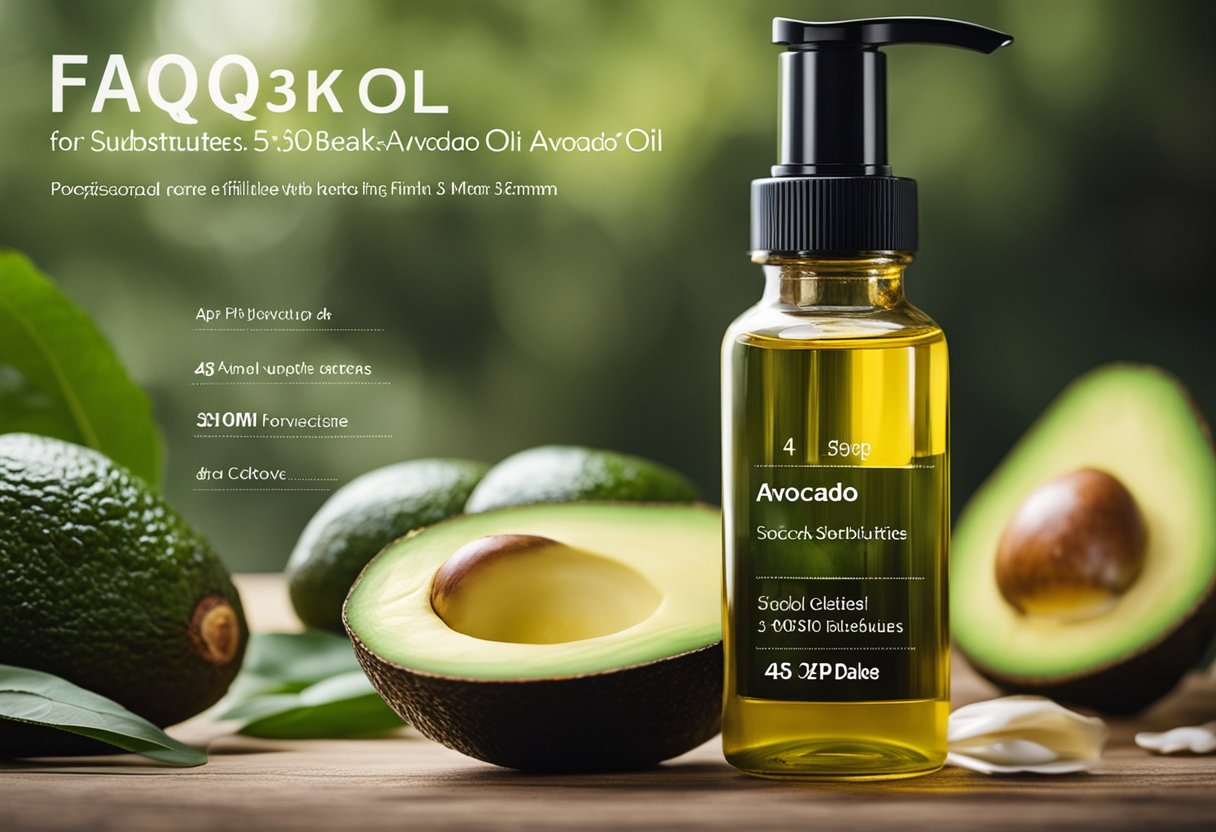
What are some good substitutes for avocado oil in cooking?
There are several good substitutes for avocado oil in cooking. Olive oil, coconut oil, grapeseed oil, and sesame oil are all great options.
Each of these oils has a unique flavor profile and works well in different types of dishes. For example, olive oil is great for sautéing vegetables, while coconut oil adds a delicious tropical flavor to stir-fries.
How does the smoke point of avocado oil compare to other oils?
Avocado oil has a high smoke point, which makes it great for high-heat cooking methods like frying and roasting.
However, there are other oils that have similar or even higher smoke points, such as safflower oil and sunflower oil. It’s important to choose an oil with a smoke point that is appropriate for the cooking method you are using.
What can I use instead of avocado oil in baking?
When it comes to baking, there are several good substitutes for avocado oil. Coconut oil, canola oil, and vegetable oil are all great options.
Each of these oils has a neutral flavor profile that won’t overpower the other ingredients in your baked goods.
Are there any health benefits to using avocado oil over canola oil?
Avocado oil is often touted as a healthier alternative to canola oil because it is high in monounsaturated fats and antioxidants.
However, both oils are relatively healthy and can be part of a balanced diet. It’s important to choose an oil that works well for your specific dietary needs and preferences.
Can I substitute avocado oil for butter in salad dressing?
Yes, you can substitute avocado oil for butter in salad dressing. Avocado oil has a neutral flavor profile that won’t overpower the other ingredients in your dressing.
It also has a high smoke point, which makes it a great choice for making vinaigrettes and other types of dressings.
What are some alternatives to avocado in recipes?
If you’re looking for alternatives to avocado in recipes, there are several options to choose from. Hummus, tahini, and Greek yogurt are all great substitutes for avocado in dips and spreads.
For salads, try using roasted vegetables or nuts instead of avocado. And for sandwiches, try using sliced cucumbers or roasted red peppers instead of avocado.







